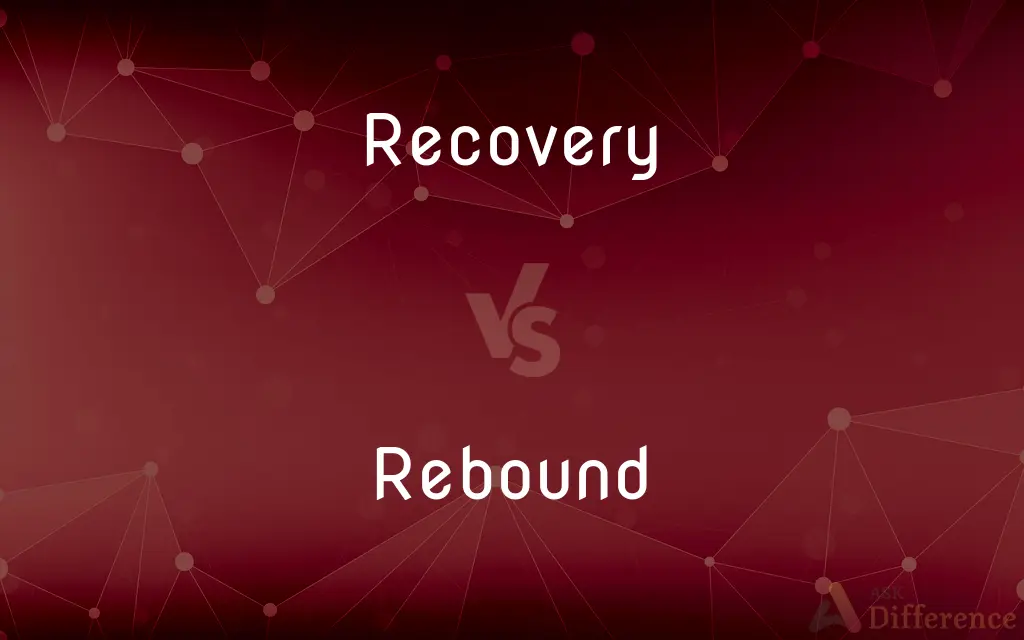Recovery vs. Rebound — What's the Difference?
By Urooj Arif & Maham Liaqat — Updated on March 20, 2024
Recovery involves a process of returning to a normal state after a downturn, while a rebound is a rapid bounce back from a low point.

Difference Between Recovery and Rebound
Table of Contents
ADVERTISEMENT
Key Differences
Recovery signifies a gradual process of improvement or returning to a normal state after experiencing a downturn or setback. This concept often applies to economies, health, and environments, indicating a slow and steady return to pre-downturn conditions. On the other hand, a rebound refers to a quick and often vigorous recovery from a low point or setback. While recovery denotes a process that may take time and involves gradual improvement, a rebound suggests a more immediate response or return to previous levels.
In the context of health, recovery from an illness entails a period of rest, treatment, and gradual improvement in health. It often involves a careful plan to regain strength and wellness over time. In contrast, a rebound in health might refer to a rapid improvement or return to good health following a minor illness, with the individual quickly feeling better and resuming normal activities.
Economically, recovery can describe the period after a recession when economic indicators such as employment rates and GDP growth gradually return to their pre-recession levels. This process can take years and involves policy measures, consumer confidence restoration, and rebuilding of markets. Whereas, an economic rebound might occur after a brief economic downturn, where the economy quickly bounces back to growth, often fueled by pent-up demand or a surge in consumer spending.
In environmental contexts, recovery might refer to the gradual restoration of an ecosystem after being damaged by events like deforestation, pollution, or natural disasters. This process can take decades, requiring concerted efforts in reforestation, pollution clean-up, and habitat restoration. Conversely, a rebound in an environmental context could imply a swift improvement in environmental conditions, such as air quality improvement after temporary pollution reduction measures are implemented.
The term recovery also implies a sense of resilience and adaptation, suggesting that the process might result in changes or improvements that make the system stronger or more sustainable than before. Whereas a rebound might simply mean returning to the status quo without any significant changes or improvements, often temporary and may not address underlying issues.
ADVERTISEMENT
Comparison Chart
Definition
A gradual process of returning to a normal or stable state after a downturn.
A rapid bounce back or improvement from a low point.
Timeframe
Long-term
Short-term
Application
Health, economies, environments
Health, economies, stock markets
Underlying Changes
May involve significant changes or improvements
Often returns to the status quo without underlying changes
Indicator of Progress
Steady, incremental improvements
Quick, significant improvements
Compare with Definitions
Recovery
Typically long-term, reflecting a slow return to pre-downturn conditions.
The forest's recovery from the wildfire is expected to take decades.
Rebound
A quick and vigorous return to a previous level or state after a decline.
The stock market experienced a strong rebound after the initial shock of the news.
Recovery
A gradual return to a normal state after a setback.
The patient's recovery from surgery took several weeks.
Rebound
Short-term, emphasizing immediate recovery.
There was a noticeable rebound in consumer confidence following the policy announcement.
Recovery
May lead to changes or adaptations for better resilience.
The recovery efforts post-flood included building stronger levees.
Rebound
Returns to the status quo, potentially without significant changes.
The rebound in air quality was temporary, reverting back as restrictions were lifted.
Recovery
Involves a series of steps or measures towards improvement.
The country's economic recovery was evident in its increasing employment rates.
Rebound
Rapid and often temporary.
The athlete's rebound in performance surprised everyone.
Recovery
On gradual improvement and resilience.
Her recovery after the illness showed her strong will to get better.
Rebound
On quick restoration without necessarily addressing underlying issues.
The rebound in sales was encouraging, but the company knew it had to solve deeper problems.
Recovery
The act, process, duration, or an instance of recovering.
Rebound
Bounce back through the air after hitting something hard
His shot hammered into the post and rebounded across the goal
Recovery
A return to a normal or healthy condition.
Rebound
Recover in value, amount, or strength after a decrease or decline
The Share Index rebounded to show a twenty-point gain
Recovery
The act of obtaining usable substances from unusable sources.
Rebound
(of an event or action) have an unexpected adverse consequence for (someone, especially the person responsible for it)
Nicholas's tricks are rebounding on him
Recovery
The act or process of regaining or repossession of something lost.
Rebound
(in sporting contexts) a ball or shot that bounces back after striking a hard surface
He blasted the rebound into the net
Recovery
A return to normal health.
Rebound
An increase in value, amount, or strength after a previous decline
They revealed a big rebound in profits for last year
Recovery
A return to former status or position.
Rebound
To spring or bounce back after hitting or colliding with something.
Recovery
The act of regaining the natural position after curtseying.
Rebound
To recover, as from depression or disappointment.
Recovery
The act of regaining the position of guard after making an attack, in fencing, sparring, etc.
Rebound
To reecho; resound.
Recovery
(economics) Renewed growth after a slump.
Rebound
(Basketball) To retrieve and gain possession of the ball as it bounces off the backboard or rim after an unsuccessful shot.
Recovery
(finance) The recovery of debt.
Rebound
To cause to rebound.
Recovery
(legal) A verdict giving somebody the right to recover debts or costs.
Rebound
(Basketball) To gain possession of (the ball) off the backboard or rim.
Recovery
(mining) The extraction of an ore from a mine, or of a metal from an ore
Rebound
Past tense and past participle of rebind.
Recovery
(gaming) The ability to recover or regain health.
Rebound
To bind again, especially to put a new binding on (a book).
Recovery
The act of recovering, regaining, or retaking possession.
Rebound
A springing or bounding back; a recoil.
Recovery
Restoration from sickness, weakness, faintness, or the like; restoration from a condition of mistortune, of fright, etc.
Rebound
(Sports) A rebounding or caroming ball or hockey puck, especially coming off of a goalie who has blocked a shot.
Recovery
The obtaining in a suit at law of a right to something by a verdict and judgment of court.
Rebound
(Basketball) The act or an instance of taking possession of a rebounding ball.
Recovery
The getting, or gaining, of something not previously had.
Rebound
A quick recovery from or reaction to disappointment or depression
He is on the rebound following a tumultuous breakup.
Recovery
In rowing, the act of regaining the proper position for making a new stroke.
Rebound
A book that has been rebound.
Recovery
Act of regaining the natural position after curtseying.
Rebound
The recoil of an object bouncing off another.
Recovery
Act of regaining the position of guard after making an attack.
Rebound
A return to health or well-being; a recovery.
I am on the rebound.
Recovery
Return to an original state;
The recovery of the forest after the fire was surprisingly rapid
Rebound
An effort to recover from a setback.
Recovery
Gradual healing (through rest) after sickness or injury
Rebound
(colloquial) The period of getting over a recently ended romantic relationship.
Recovery
The act of regaining or saving something lost (or in danger of becoming lost)
Rebound
(colloquial) A romantic partner with whom one begins a relationship (or the relationship one begins) for the sake of getting over a previous, recently ended romantic relationship.
Rebound
(sports) The strike of the ball after it has bounced off a defending player or the crossbar or goalpost.
Rebound
(basketball) An instance of catching the ball after it has hit the rim or backboard without a basket being scored, generally credited to a particular player.
Rebound
To bound or spring back from a force.
Rebound
To give back an echo.
Rebound
(figuratively) To jump up or get back up again.
Rebound
(transitive) To send back; to reverberate.
Rebound
Simple past tense and past participle of rebind
Rebound
To spring back; to start back; to be sent back or reverberated by elastic force on collision with another body; as, a rebounding echo.
Bodies which are absolutely hard, or so soft as to be void of elasticity, will not rebound from one another.
Rebound
To give back an echo.
Rebound
To bound again or repeatedly, as a horse.
Rebound
To recover, as from sickness, psychological shock, or disappointment.
Rebound
To send back; to reverberate.
Silenus sung; the vales his voice rebound.
Rebound
The act of rebounding; resilience.
Flew . . . back, as from a rock, with swift rebound.
Rebound
Recovery, as from sickness, psychological shock, or disappointment.
Rebound
A movement back from an impact
Rebound
A reaction to a crisis or setback or frustration;
He is still on the rebound from his wife's death
Rebound
The act of securing possession of the rebounding basketball after a missed shot
Rebound
Spring back; spring away from an impact;
The rubber ball bounced
These particles do not resile but they unite after they collide
Rebound
Return to a former condition;
The jilted lover soon rallied and found new friends
The stock market rallied
Common Curiosities
Is a rebound always a positive outcome?
While a rebound indicates a quick improvement, it may not address underlying issues and can be temporary.
What is recovery?
Recovery is a gradual process of returning to a normal state after experiencing a downturn or setback.
What is a rebound?
A rebound is a rapid bounce back from a low point or decline.
Can recovery lead to changes or improvements?
Yes, recovery often involves changes or adaptations that may improve resilience or functionality.
Can a rebound be part of the recovery process?
Yes, a rebound can be an initial phase in the broader recovery process.
Is a rebound in environmental conditions sustainable?
A rebound might not be sustainable without addressing the root causes of environmental degradation.
Can an environment recover from pollution?
Yes, environmental recovery from pollution is possible but typically requires a long-term effort.
Is recovery always slower than a rebound?
Generally, yes. Recovery is a more gradual process compared to the quicker nature of a rebound.
Can recovery lead to a better-than-original state?
Yes, recovery can incorporate improvements that enhance resilience or efficiency beyond the original state.
How do recovery and rebound differ in timeframe?
Recovery is a long-term process, while a rebound is typically short-term.
How do recovery and rebound apply to health?
Recovery in health implies gradual healing, whereas a rebound refers to a rapid return to good health.
Do recovery and rebound require intervention?
Recovery often requires deliberate intervention or policy measures, whereas a rebound may occur naturally or with minimal intervention.
How do economic recovery and rebound differ?
Economic recovery is a slow return to pre-recession conditions, while an economic rebound is a quick improvement after a downturn.
What does a rebound in stock markets indicate?
A rebound in stock markets indicates a quick recovery in stock prices after a decline.
How can individuals contribute to recovery efforts?
Individuals can contribute by adopting sustainable practices, supporting policies for improvement, and participating in restoration initiatives.
Share Your Discovery

Previous Comparison
Conformity vs. Individuality
Next Comparison
Maltese vs. BichonAuthor Spotlight
Written by
Urooj ArifUrooj is a skilled content writer at Ask Difference, known for her exceptional ability to simplify complex topics into engaging and informative content. With a passion for research and a flair for clear, concise writing, she consistently delivers articles that resonate with our diverse audience.
Co-written by
Maham Liaqat













































